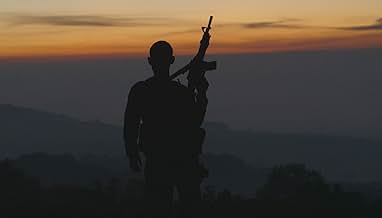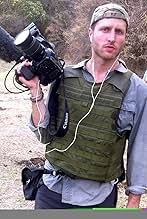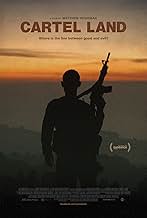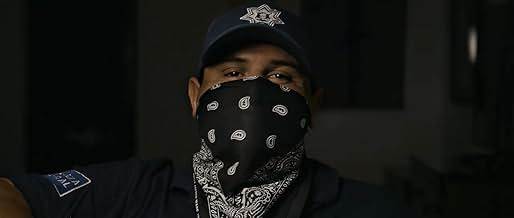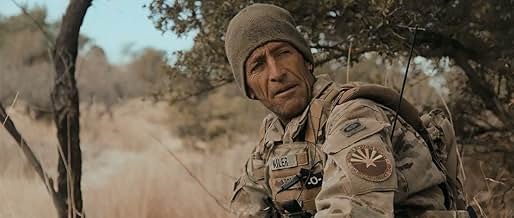IMDb रेटिंग
7.3/10
19 हज़ार
आपकी रेटिंग
अपनी भाषा में प्लॉट जोड़ेंFilmmaker Matthew Heineman examines the state of the ongoing drug problem along the U.S.-Mexican border.Filmmaker Matthew Heineman examines the state of the ongoing drug problem along the U.S.-Mexican border.Filmmaker Matthew Heineman examines the state of the ongoing drug problem along the U.S.-Mexican border.
- 1 ऑस्कर के लिए नामांकित
- 19 जीत और कुल 38 नामांकन
Nicolás Sierra
- Self
- (as as Nicolás Sierra 'El Gordo')
Alfredo Castillo Cervantes
- Self - Mexican political
- (as Alfredo Castillo)
María Imilse Arrué
- Self
- (as María Imilse)
फ़ीचर्ड समीक्षाएं
Editors note:
Almost always people comment on films on this website in quite a good way. So I never felt the urge to write/contribute something....
The film:
First of all I never wrote a review on this website before. And to be honest i don't think this will count as a review. Actually it was never my intention to write a review but more so to ask a critical question... Is this still a documentary? The quality of the images, the story and of the film in general are mind blowing! It gets you thinking and shows you the good, the bad and the ugly (pun intended).The story itself and the people involved are real, but in my opinion this is a reenactment! Staged, beautifully done but staged... The subject and the way they showed it is compelling, brutal at times, and it will get you thinking but I can't lose the feeling i watched a movie/film and not a documentary... Which is either brilliant or bad... Help me out, your thoughts pls.
Almost always people comment on films on this website in quite a good way. So I never felt the urge to write/contribute something....
The film:
First of all I never wrote a review on this website before. And to be honest i don't think this will count as a review. Actually it was never my intention to write a review but more so to ask a critical question... Is this still a documentary? The quality of the images, the story and of the film in general are mind blowing! It gets you thinking and shows you the good, the bad and the ugly (pun intended).The story itself and the people involved are real, but in my opinion this is a reenactment! Staged, beautifully done but staged... The subject and the way they showed it is compelling, brutal at times, and it will get you thinking but I can't lose the feeling i watched a movie/film and not a documentary... Which is either brilliant or bad... Help me out, your thoughts pls.
"Carte Land" (2015 release; 100 min.) is a documentary that examines what is happening in the Mexican state of Michoacán, in south-west Mexico (about 1,000 miles from the US border), and in a separate story, we also take a look at what some people are doing at the Arizona border with Mexico. As the documentary opens, we see Mexican guys cooling up meth somewhere in Michoacán. Comments one: "We know we do harm, but we come from poverty". Then we get to know a woman, who lost 13 (!) family members, all brutally murdered by the cartel when their employer (owner of a lime orchard) couldn't pay the cartel, so they shot his employees as revenge. Then we get to know Dr. Mireles, a Michoacán-based physician who is sick and tired of the violence, and realizing that the official authorities will not/cannot do anything, he decides to start the Autodefensas, a grass roots movement to claim back the streets and towns of Michoacán.
Couple of comments: first, this is another documentary from producer-director Matthew Heineman, and with this latest, he hits the bull's eye. The situation in the Mexican state of Michoacán is so bad that people are outright desperate for relief, ANY relief. There is an astonishing scene that plays out in the city of Apo, where the Autodefensas capture several cartel members. Then the Mexican Army comes sweeping in, and tries to disarm the Autodefensas (yes! not the cartel). The town's population quickly gathers and essentially howls the Army back out of town. Jaw-dropping. There are other such scenes in this riveting, and revolting, documentary. With revolting, I refer of course to the deplorable situation the Mexican people find themselves in, left to their own devices with the state or federal authorities pretty much absent. Beware, on several occasions there is shocking forage or pictures, and this documentary is most certainly not for the faint of heart. Second, the 'parallel' story of the Arizona Border Recon, with veterans taking it on themselves to patrol the border to keep migrants out, falls utterly short and frankly looks a bit silly as compared to the stuff we see happening in Michoacán. It would've made the documentary even better by simply focusing on what is happening on the ground in Mexico. But even with that unnecessary side story, "Cartel Land" is an unforgettable documentary.
"Cartel Land" made quite a splash at the Sundance Film Festival earlier this year, and when out of the blue this showed up at my local art-house theater here in Cincinnati this weekend, I couldn't believe my luck and went to see it right away. The matinée screening where I saw this at was a private affair, as in: I literally was the only person in the theater. That is a darn shame, as "Cartel Land" makes for compelling, if at times uncomfortable, viewing. If you get an opportunity to check this out and draw your own conclusions, be it at the theater, on Amazon Instant Video, or eventually on DVD/Blu-ray, do not miss it! "Cartel Land" is HIGHLY RECOMMENDED!
Couple of comments: first, this is another documentary from producer-director Matthew Heineman, and with this latest, he hits the bull's eye. The situation in the Mexican state of Michoacán is so bad that people are outright desperate for relief, ANY relief. There is an astonishing scene that plays out in the city of Apo, where the Autodefensas capture several cartel members. Then the Mexican Army comes sweeping in, and tries to disarm the Autodefensas (yes! not the cartel). The town's population quickly gathers and essentially howls the Army back out of town. Jaw-dropping. There are other such scenes in this riveting, and revolting, documentary. With revolting, I refer of course to the deplorable situation the Mexican people find themselves in, left to their own devices with the state or federal authorities pretty much absent. Beware, on several occasions there is shocking forage or pictures, and this documentary is most certainly not for the faint of heart. Second, the 'parallel' story of the Arizona Border Recon, with veterans taking it on themselves to patrol the border to keep migrants out, falls utterly short and frankly looks a bit silly as compared to the stuff we see happening in Michoacán. It would've made the documentary even better by simply focusing on what is happening on the ground in Mexico. But even with that unnecessary side story, "Cartel Land" is an unforgettable documentary.
"Cartel Land" made quite a splash at the Sundance Film Festival earlier this year, and when out of the blue this showed up at my local art-house theater here in Cincinnati this weekend, I couldn't believe my luck and went to see it right away. The matinée screening where I saw this at was a private affair, as in: I literally was the only person in the theater. That is a darn shame, as "Cartel Land" makes for compelling, if at times uncomfortable, viewing. If you get an opportunity to check this out and draw your own conclusions, be it at the theater, on Amazon Instant Video, or eventually on DVD/Blu-ray, do not miss it! "Cartel Land" is HIGHLY RECOMMENDED!
Greetings again from the darkness - from the Dallas International Film Festival. Even in this digital age where information exists from all sides of a conflict
often with corresponding video, the general public somehow remains complacent to issues that don't directly and obviously affect their lifestyle. Skilled documentarian Matthew Heineman ignores the rhetoric of political speeches and plops the war against drug cartels right into our lap.
This is a different approach to a topic with which we are all at least somewhat familiar. The involved parties include the affected communities (in Mexico and Arizona), the governments and affiliated agencies (DEA, Border Patrol), the ever-expanding vigilante groups of citizens (Arizona Border Recon, AutoDefensas), and of course the cartels (focus on Knights Templar).
Intimacy is the key here, as Mr. Heineman takes us inside these groups with an up-close look at leaders. Especially fascinating is Dr. Mireles who is the face of the AutoDefensas – a group he pledges will protect communities from the cartels, who clearly have no regard for human life. The film doesn't shy away from the expected issues: citizen pushback, greed, abuse of power, and corruption. As AutoDefensas teams with the Mexican government to create the Rural Defense Force, we can't help but wonder if the rumors of differing goals are at play in the drug battles. Citizens want safety, but what is it that the government wants? Is the goal drug-free streets or is it a cut of the action.
Learning how desperate the vigilantes are to protect their homes, turf and way of life, we are left with little doubt of their mission. It's everyone else that we must keep questioning and holding accountable. This is not an easy documentary to watch, but it's necessary if you have previously lost interest as the next politician proclaims he will continue "the war on drugs".
This is a different approach to a topic with which we are all at least somewhat familiar. The involved parties include the affected communities (in Mexico and Arizona), the governments and affiliated agencies (DEA, Border Patrol), the ever-expanding vigilante groups of citizens (Arizona Border Recon, AutoDefensas), and of course the cartels (focus on Knights Templar).
Intimacy is the key here, as Mr. Heineman takes us inside these groups with an up-close look at leaders. Especially fascinating is Dr. Mireles who is the face of the AutoDefensas – a group he pledges will protect communities from the cartels, who clearly have no regard for human life. The film doesn't shy away from the expected issues: citizen pushback, greed, abuse of power, and corruption. As AutoDefensas teams with the Mexican government to create the Rural Defense Force, we can't help but wonder if the rumors of differing goals are at play in the drug battles. Citizens want safety, but what is it that the government wants? Is the goal drug-free streets or is it a cut of the action.
Learning how desperate the vigilantes are to protect their homes, turf and way of life, we are left with little doubt of their mission. It's everyone else that we must keep questioning and holding accountable. This is not an easy documentary to watch, but it's necessary if you have previously lost interest as the next politician proclaims he will continue "the war on drugs".
Are vigilantes reluctant heroes taking up arms to defend their communities? Or men of violence looking for a cause in which to fight? Can a band of local activists protect the people against a corrupt government? Or is an self-appointed institution always doomed, by its very nature, to be guilty of the same crimes it is founded to eliminate? Where does the greatest threat to a popular movement come from - the personal failings of a charismatic leader who can satisfy, but only for a moment, the people's desire for a saviour, or in the slime-ball sellouts who would replace him? These questions are deftly posed by 'Cartel Land', a documentary about the drug trade that focuses on the odd right-wing Minutemen of southern Arizona, who seem to feel it necessary to patrol the Mexican border for reasons unapparent, and the Atodefensas of central Mexico, a self-defence force fighting the drug cartels out of a self-evident desire for mere survival but which might possibly be just a new cartel in the making. The only certain conclusion from Matthew Heiman's bleak, compelling film is that the war on drugs is a war that can only be lost.
This moving and compelling documentary paints a vivid picture of the tragic situation involving the cartels, police, military, government, and citizens of Mexico. This story is too little known north of the border, and that's why this documentary is important and should be seen. The director's bravery in obtaining some amazing footage is to be commended.
However, in my opinion the filmmaker has made a serious and even offensive misstep in trying to create a parallel between the vigilantes of the Autodefensas and the vigilantes of the Arizona Border Recon. Quoting from the doc's website, the premise is that these groups "vie to bring their own brand of justice to a society where institutions have failed."
It's abundantly clear that in Mexico, to put it as neutrally as possible, institutions (government, police, military) have failed to protect citizens from cartel- sponsored violence. The tragic consequences of this failure are made disturbingly real in the film.
However, the idea that U.S. government, police, and military have failed to protect the citizens of Arizona from cartel-sponsored violence is just absurd. Worse, by comparing a flawed Mexican leader who is apparently sincerely trying to address a horrific situation to a flawed American "leader" who is off on some crackpot right-wing conspiracy theory where the danger is mostly in his head, the film ends up insulting the actual pain and suffering experienced by the people of Mexico. However much the Arizona guy wants to say he's really focusing on the cartel's activity in the Arizona desert (how does that work, again?), his true motive is to stop people from crossing the border because he has an anti-immigration ax to grind. However you feel about immigration, U.S.-based anti- immigrant vigilantism is not analogous to the motives or efforts of the Autodefensas. Comparing the two insults the Mexican people's suffering and the Autodefensas courage, however flawed their leaders and unsuccessful their efforts may be.
If the filmmaker wanted to bring in important information from the U.S. side of the border, he might have tried providing some information about how our government's "War on Drugs" has paralleled the cartel's rise (coincidence?), or the blood that's on our hands because we're the ones buying the drugs.
Instead, he makes a false parallel with a group of anti-immigrant wingnuts. If you want to make a documentary to show that anti- immigrant wingnuts are people too, go ahead, but don't try to compare the Arizona Border Recon to the Autodefensas. That's not an intellectually fascinating parallel, as the filmmaker apparently believes. It's just pretentious and, really, disgusting.
However, in my opinion the filmmaker has made a serious and even offensive misstep in trying to create a parallel between the vigilantes of the Autodefensas and the vigilantes of the Arizona Border Recon. Quoting from the doc's website, the premise is that these groups "vie to bring their own brand of justice to a society where institutions have failed."
It's abundantly clear that in Mexico, to put it as neutrally as possible, institutions (government, police, military) have failed to protect citizens from cartel- sponsored violence. The tragic consequences of this failure are made disturbingly real in the film.
However, the idea that U.S. government, police, and military have failed to protect the citizens of Arizona from cartel-sponsored violence is just absurd. Worse, by comparing a flawed Mexican leader who is apparently sincerely trying to address a horrific situation to a flawed American "leader" who is off on some crackpot right-wing conspiracy theory where the danger is mostly in his head, the film ends up insulting the actual pain and suffering experienced by the people of Mexico. However much the Arizona guy wants to say he's really focusing on the cartel's activity in the Arizona desert (how does that work, again?), his true motive is to stop people from crossing the border because he has an anti-immigration ax to grind. However you feel about immigration, U.S.-based anti- immigrant vigilantism is not analogous to the motives or efforts of the Autodefensas. Comparing the two insults the Mexican people's suffering and the Autodefensas courage, however flawed their leaders and unsuccessful their efforts may be.
If the filmmaker wanted to bring in important information from the U.S. side of the border, he might have tried providing some information about how our government's "War on Drugs" has paralleled the cartel's rise (coincidence?), or the blood that's on our hands because we're the ones buying the drugs.
Instead, he makes a false parallel with a group of anti-immigrant wingnuts. If you want to make a documentary to show that anti- immigrant wingnuts are people too, go ahead, but don't try to compare the Arizona Border Recon to the Autodefensas. That's not an intellectually fascinating parallel, as the filmmaker apparently believes. It's just pretentious and, really, disgusting.
क्या आपको पता है
- ट्रिवियाThe Autodefensas group shown in the film was created by civilians to stand up against the cartels because the government is overrun with corruption. Individuals speak about how little the Mexican president (Enrique Peña Nieto) is doing. In the film, the Autodefensas is shown celebrating its one year anniversary on February 24, 2014. On that exact same day, TIME Magazine ran an issue with the Mexican President Enrique Peña Nieto with the headline "Saving Mexico." Nieto reportedly paid TIME $44,000 for this cover article coincidentally released on the same day as the Autodefensas anniversary.
- भाव
José Manuel 'El Doctor' Mireles: Get everything you can out of him, and then put him in the ground.
- साउंडट्रैकEn Las Calles
Written by H. Scott Salinas and Jose Cancela
टॉप पसंद
रेटिंग देने के लिए साइन-इन करें और वैयक्तिकृत सुझावों के लिए वॉचलिस्ट करें
- How long is Cartel Land?Alexa द्वारा संचालित
विवरण
- रिलीज़ की तारीख़
- कंट्री ऑफ़ ओरिजिन
- आधिकारिक साइट
- भाषाएं
- इस रूप में भी जाना जाता है
- Земля картелів
- फ़िल्माने की जगहें
- उत्पादन कंपनियां
- IMDbPro पर और कंपनी क्रेडिट देखें
बॉक्स ऑफ़िस
- US और कनाडा में सकल
- $7,04,352
- US और कनाडा में पहले सप्ताह में कुल कमाई
- $15,581
- 5 जुल॰ 2015
- दुनिया भर में सकल
- $11,45,923
- चलने की अवधि1 घंटा 40 मिनट
- रंग
- पक्ष अनुपात
- 2.35 : 1
इस पेज में योगदान दें
किसी बदलाव का सुझाव दें या अनुपलब्ध कॉन्टेंट जोड़ें







